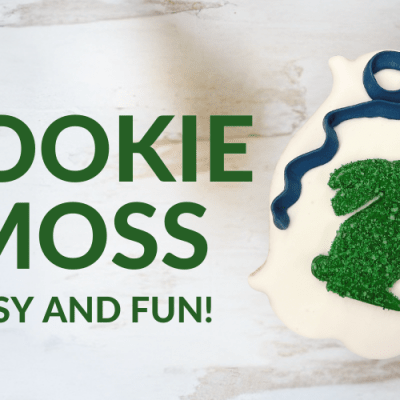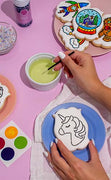
Cookier Takeaways
Nine years ago this Halloween, I made my very first ever decorated sugar cookies. I had seen a video tutorial on Facebook, and after falling down a rabbit hole watching flooding video after flooding video, I thought to myself, “I bet I can do that.” My first cookies were classic Halloween, with a spider (Wilton sugar eyeballs and all), a bat, and a spiderweb. When I flooded that first spider and gently shook the cookie the way the tutorials assured me I should, I was flooded with adrenaline and serotonin when that icing smoothed itself out right on cue. I’m pretty sure I shouted in victory “IT WORKS!!!” And by “pretty sure,” I mean definitely sure, as this was a core memory that will stick with me forever lol. I was hooked. I immediately started making cookies for friends and family, watching as many tutorials as I could find. I’m not big on eating iced cookies myself in general, so I was happy to pass these works of art out at any opportunity.
But, anyone who was ever new to cookie-ing can probably attest that royal icing can be a tooth breaker if it’s overworked, or if you use too much meringue powder. And let me tell you, those first iced cookies could probably have been used as lethal weapons. Midnight intruder? Huck a cookie at them, and they’ll be down for the count. Need a new hockey puck? Brb let me grab a cookie for you. I mean, it may not have been as bad as I’m remembering, but as I fine tuned my process and my recipes over time, I look back and wonder what on earth I was thinking. But hey, that’s the nature of practicing a new craft, and the only way to get better is to stick it out and practice.
As I looked back at this first set of cookies, a few thoughts struck me as key realizations in my cookie journey.

First, and obviously most importantly of all: keep practicing and refining your recipes until you’re happy with them. There’s no cookie law that says you have to stick with the first recipe you ever try. There’s also no law that says just because hundreds of cookiers swear by a recipe that you have to love it too. What works for me may not work for thee. You may go through more butter and vanilla than you’d like to think about as you experiment, but it’s worth it. I loved my cookie recipe itself, but it had a tendency to spread. Well, ain’t nobody got time for that, so I kept refining until I found a recipe I could tweak to my flavor preferences that didn’t spread at all. Same thing for the icing. After becoming a little gun-shy about the hardness of royal icing, I switched to a glaze recipe, which was delicious and a lot easier on the teeth. But as I made more elaborate designs, I found that the glaze just wasn’t cutting it for me anymore, so I started playing with adding meringue powder again in varying amounts (and varying mixing times) in order to be able to achieve the stiffness I was looking for for florals in particular. After some experimentation, I settled onto a recipe that is soft on the tooth but also has the stability I needed. At the end of the day, the takeaway is to not feel trapped by what you have “always” done. It’s ok to go back to the drawing board and build a new foundation. After all, if the goal is for people to actually eat the cookies instead of just admiring how pretty they are, then they should taste good, too. And if you’re like me and don’t really love the taste of icing, then curate a close test group of people who will give it to you straight about the taste and texture of your cookies. I used to walk what I called “reject” cookies over to two of my neighbors to have them review them for me. As I nailed down my recipes and got better at decorating, they now lament that I don’t have “rejects” anymore. Sad for them, but a lot less wasteful for me!

My second most important cookie realization deals with royal icing consistency, but it kind of goes back to the first one: if something isn’t working, then change it. Don’t stick with a bad product because you feel like you have to make it work. I can’t tell you how many times I mixed and bagged icing, only to realize that whatever consistency I had was going to require some…persuasion. Whether that means a ton of shaking the cookie, or using a scribe to drag the icing to where it needs to be, or scraping escaping flood icing off the edges of cookies—why do that to myself?! It’s much easier to just dump the icing back into a bowl, adjust the consistency one way or the other, and re-bag it. At the end of the day, the time required to re-bag and remix would be much less than the time required to constantly manipulate the icing once it’s on the cookie. Nowadays, I’m much quicker to call TOD on something that’s not working, and it saves me time and peace of mind.

You also don’t always need all the fancy tools…unless you do lol. This will really be determined by what kind of cookier you plan to be. If I had kept just making cookies for my kids, then I definitely would not have ever invested in a projector. After all, they don’t care what font I use to write Happy Birthday, and way back when, I wouldn’t have even dreamed of taking a cookie order requiring hand lettering. But nowadays, the bride who asks for wedding shower cookies may want me to match the font from her shower invite, and using a projector makes the process exponentially easier and faster for me to add hand lettering than tracing it on with an edible marker and having to go over it with icing. The cookier I was nine years ago (or even five years ago) did not need a projector. Now? It’s one of my go-to tools. The same goes with my airbrush system and stencils. I had been doing cookies for a few years before I ever picked up a stencil. Now when I’m designing a set, I look for the opportunities to incorporate a stencil design that can up the wow factor while also making my life a little easier than hand-painting or wet-on-wet might.
Recommended for You:
Piping Bag Tip Tube Covers - Set of 4
AtecoDon't let your icing bags leak or dry out! Use these covers on bags with Ateco couplers and standard tips on them. Reuse them again and again. Se...
View full detailsBlack Fine Tip Food Marker
The Cookie CountessA black edible-ink pen is essential for your decorating kit. Use these high quality markers for: Marking up baked cookies for planning designs Wr...
View full detailsStainless Steel Measuring Cups 4 Piece Set
The Cookie CountessIncredibly high quality, with no plastic parts. Whether baking or cooking you'll reach for these essentials again and again! THESE ARE THE LAST SET...
View full detailsInstant Royal Icing Mix - White Base
The Cookie CountessJust add water for white, stiff icing! Perfect for stenciling, dots and eyes, writing, or thin it for flooding. You can tint it any color you need...
View full detailsCookie Order Form 5 x 7, 50 sheets
The Cookie CountessThese cute sheets will help you plan your cookie orders. The back has an area for sketching and pricing planning. Size: 5" x 7" 50 Sheet Pad Doub...
View full details-

Decorating a Vintage Heart Cake Cookie
Read nowYou've probably noticed that vintage heart cakes are having a MOMENT. It seems like everywhere you look, you'll see adorable heart cakes with fluffy borders, ruffles and swooshes and bows and cherries. The more ornate, the better. What's old is...
-

How To Make Cookie Moss!
Read nowAfter posting my recent blog about how to make ribbon bows, I had lots of questions about how I made the moss bunny. And I am at your service! So here are step by step instructions on how to make...
-

Ribbon Bows - Everything you need to know!
Read nowUnless you've just returned from a deserted island, you've probably noticed that ribbon bows have taken over cookie decorating. And I am TOTALLY here for it! Ribbon bows are the perfect sweet and girlie touch for so many designs and...
















Leave a comment